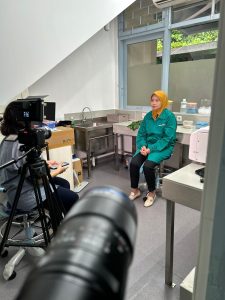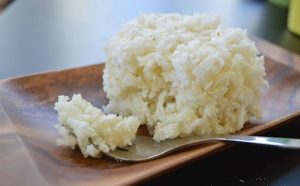 Cassava is a root vegetable with several benefits, from the root to the leaves. The most frequent part of being consumed is the root, which is mainly consumed as steamed, boiled or fried cassava. The leaves are commonly found in Indonesian cuisine as side dishes served with rice and rendang meat or cooked with coconut milk as “gulai”. In some parts of rural districts in Indonesia, cassava has been processed as a rice substitute for a long decade since the rice is commonly pricey for the villagers or cannot be cultivated as frequently as cassava. In general, rice can be harvested twice a year, sometimes three times at the most, while cassava is possibly more than that. The other benefit of cassava is that it has a lower glycemic index but is rich in carbohydrates, which is potentially better than rice for people with diabetes. Cassava roots are also a good source of vitamin C, which is good for immunity, and resistant starch, which is good for the gut, improving blood sugar management and increasing feeling of fullness, which is good for people with obesity to control their appetite and body weight. Not only the health benefits, but cassava consumption also needs to be encouraged as the staple food substitute to increase diversification. Since the rice dependency in Indonesia is growing while the rice production may not be sufficient for the entire population, alternative food needs to be introduced, and cassava can play the role of a main character.
Cassava is a root vegetable with several benefits, from the root to the leaves. The most frequent part of being consumed is the root, which is mainly consumed as steamed, boiled or fried cassava. The leaves are commonly found in Indonesian cuisine as side dishes served with rice and rendang meat or cooked with coconut milk as “gulai”. In some parts of rural districts in Indonesia, cassava has been processed as a rice substitute for a long decade since the rice is commonly pricey for the villagers or cannot be cultivated as frequently as cassava. In general, rice can be harvested twice a year, sometimes three times at the most, while cassava is possibly more than that. The other benefit of cassava is that it has a lower glycemic index but is rich in carbohydrates, which is potentially better than rice for people with diabetes. Cassava roots are also a good source of vitamin C, which is good for immunity, and resistant starch, which is good for the gut, improving blood sugar management and increasing feeling of fullness, which is good for people with obesity to control their appetite and body weight. Not only the health benefits, but cassava consumption also needs to be encouraged as the staple food substitute to increase diversification. Since the rice dependency in Indonesia is growing while the rice production may not be sufficient for the entire population, alternative food needs to be introduced, and cassava can play the role of a main character.


That is the topic that is discussed by Prof. Dr Lily Arsanti Lestari, MP, a lecturer at the Department of Health Nutrition, Faculty of Medicine, Public Health and Nursing, UGM, with TVRI Yogyakarta as the documentary and educational video that will be aired at the TV station. The interview with Prof. Lily was conducted on January 21, 2025, at the laboratory of the Health Nutrition Department. It is a part of community service activity which aims to educate people about the health benefits of cassava and its potential as a food diversification commodity, which also supports the SDG goal to reach good health and well-being and to prevent hunger that is in line with the goal number 2 and 3.
References:
- Ajmera, R and Elliott B., What is Cassava? Health Benefits and How to Prepare It. Healthline. Accessed at the https://www.healthline.com/nutrition/cassava (February 6, 2025)
- P.W., Harlina, F.A., Fitriansyah., R. Shahzad. The challenging concept of diversifying non-rice products from cassava by changing Indonesian people’s behavior and perception: a review. Food research, Volume 7, Issue 5, 2023, pages 251-259
- Sajid Latif, Joachim Müller, Potential of cassava leaves in human nutrition: A review, Trends in Food Science & Technology, Volume 44, Issue 2, 2015, Pages 147-158
Contributors: Prof. Dr. Lily Arsanti Lestari MP., Marina Hardiyanti M.Sc; Karina Marta Istiarsiwi A.Md, team of TVRI Yogyakarta
